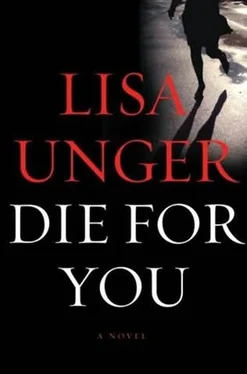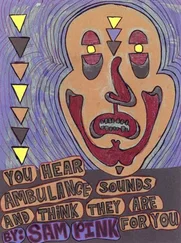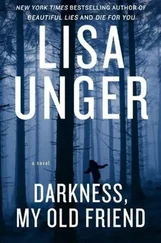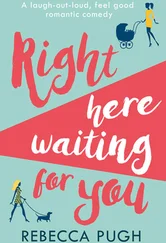“Linda!”
A quick shrug, a flutter of the eyelids (so like Margie). “That’s married with children. It’s not as bad as it sounds from the outside.” She smiled the smile of the older, wiser sister. “You’ll see.”
Not me, I thought. Never us.
And it never was quite that way with Marcus and me-not sexually. Though we fell into that domestic rhythm of work, dishes, laundry, bills, he always excited me; I never thought about the electric bill when we made love. But then again, we never had children, leaving us free from that special kind of fatigue I saw in Linda and Erik after months, going on years, of spotty sleep and an endless monitoring of needs.
And then, of course, I never really knew Marcus. I was always sleeping with a stranger, maybe subconsciously never comfortable enough, never intimate enough to allow my mind to wander. Maybe it is the unknowing that excites passion within me, the desire to understand that keeps me interested. Maybe that’s why, even when things were bad-his apathy about the pregnancy and miscarriage, his affair-I stayed. Curiosity. Who are you?
JACK WAS TALKING, pacing the room like a preacher giving a sermon, hands waving, voice raised. I wasn’t listening; I was sinking into a deep well of self-pity. I felt a barren place inside me, a place where no life could grow, where no love could last.
He’d fed me a tuna melt and made me take my antibiotics and was now lecturing me on my stupidity, threatening to call the police, or physically drag me to the lawyer himself. Jack was prone to ranting. Something to do with being born and raised in Manhattan, this loudmouthed, totally self-assured dissertation on whatever.
“This is not some novel you’re writing, Isabel,” he concluded. “This is your life.”
“What’s the difference?”
He stopped moving and fixed me with his gaze. I don’t know how to describe Jack; he’s so familiar, it’s almost as if I can’t always see him. His dark hair was a careful mess, his darker eyes always kind, always in on the divine joke of it all. There’s an interesting shape to his nose, broken during a fistfight in high school and never healed quite right. He was fit, beefy, muscular in the way of someone who spends just enough time at the gym, soft in the way of someone who can’t quite give up the foods that bring pleasure.
“You’re telling me you don’t know the difference between fact and fiction.” His eyes rested accusingly on the cut he’d just bandaged, as if this might be the culprit responsible for my mental instability.
“Not at the moment.”
“Are you just being existential, tortured? Or have you officially walked over the edge?”
The edge: the outside limit of an object, area, or surface; a place or part farthest away from the center of something. Which edge did he worry I’d stepped off-the edge of sanity, reality, reason?
“Neither. If I were writing this, right now I’d be wondering what my heroine should do next. I’d be exploring the field of possibilities. Which is precisely what I intend to do.”
“In the real world there are consequences for mistakes, Isabel.”
“In fiction, too.”
“Fine,” he snapped, frustrated with me. “But no edits, no rewrites. In the real world? Consequences are a stone wall.” He smacked fist against palm for emphasis.
I turned away from him and stared at a huge engineer’s sketch of the Brooklyn Bridge that was framed and hung on the wall-precise lines and exact measurements, tiny hand-scrawled notes about cable lengths and river span. I’d always envied engineers their exacting spirits, their certainty of tools and craft, their faith that the world would be as it was measured. My world seemed so liquid by comparison, everything shifting and changing so often as to be incalculable.
Jack had a point. A good one, which drained what little was left of my energy. I returned to the place of doubt I’d visited on the street. I thought of Detective Crowe and his number in my pocket. Everyone I cared about and respected wanted me to turn myself in to the lawyer. Why was I being so stubborn? What did I think I was going to do?
“Your phone’s ringing,” I said, lying back and examining the high white ceiling, the ornate molding, the sleek track lighting-a lovely blend of original and modern features. He really had done a stellar job with the place. I noticed a hairline crack in the ceiling, some insect corpses behind the glass in the lamps. We both listened to the faint chirping of the phone.
He shook his head. “Must be yours. Mine’s right there.” He pointed his chin toward the slim black device on the granite countertop.
“It’s not mine. I tossed my phone.”
We both looked over at Camilla’s purse. It lay where I’d dropped it with my own on Jack’s leather couch. We looked back at each other. I dove for it. He dove for me.
“Don’t answer that,” he said, grabbing my arm.
“Why not?” I pulled away from him and reached for the bag. I rummaged through the contents, until I found it still ringing and vibrating at the bottom. It was hot pink, scratched and battered. The screen blinked, Blocked number . I flipped it open and turned to Jack, triumphant. He looked stricken, as though he’d just watched me walk over a ledge. Overreacting, as usual. I didn’t say anything, just listened.
“Camilla?” A man’s voice.
I thought about it a second. “Hi,” I said, after a beat. I tried to imitate her voice from what I’d heard in our brief conversation earlier. My voice just came out sounding strangled, strange. Jack was shaking his head, inching closer to me. I wondered if he was going to try to wrest the phone away from me. Then instead he blew out a breath and walked over to the refrigerator, pulled the door open angrily. It was completely empty except for a bottle of Gray Goose, a bottle of seltzer, and a bowl of limes.
“You’re late,” said the voice on the line.
His tone was gruff, accent thick. I didn’t say anything. I wasn’t trying to be crafty. I just didn’t know how to best lead the conversation. I issued a cough, just to fill the silence that followed. Jack mouthed, Hang up the phone . He made a wide circle with his index finger at his temple. This is crazy!
“Well?” said the voice on the other line. The sound of traffic was loud behind him. A siren wailed nearby.
“I’m having some problems.” I lowered my voice to a whisper, counting on him not being able to hear me well.
There was a pause and I thought he’d caught on, that he’d hang up.
“But you’re coming?” he said finally.
I decided on silence again.
“I’ll wait-but not much longer. By the Children’s Gate, yes?”
“Yes.”
“Do you have the files?” he asked then. “Am I wasting my time?”
I decided to end the call rather than respond. The voice on the line, harsh and unyielding though it was, had a desperate edge. Camilla had something he wanted; he was waiting, though she must have been very, very late. I thought of her lying there, bleeding out, of her cooling flesh.
Jack was drinking from a lead crystal lowball, ice chinking, eyes on me.
“What do you think you’re doing?” he said. I realized I was still standing, staring at the phone in my hand.
“Do you have my money?” I asked, snapping back into the present.
The phone call had given me a little juice. The lethargy that was settling into my bones dissipated. I took Camilla’s purse and emptied the contents out onto the low coffee table.
“He said something about files,” I said.
Jack sat down across from me. I could see the curiosity on his face, though he wore a deep scowl. He was an agent, a broker of story-he loved a good one more than anyone else I knew.
Читать дальше












